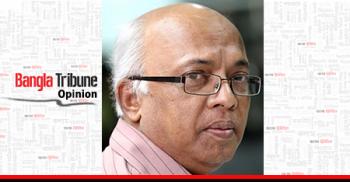 We stand enlightened. We have just been informed by a responsible functionary of the State that a mistake committed in good faith does not qualify to be a crime or an act of corruption. That certainly leads to an expansion of the imagination in us. Or, conversely, it narrows our perspectives to a point where conscience and the law do not matter.
We stand enlightened. We have just been informed by a responsible functionary of the State that a mistake committed in good faith does not qualify to be a crime or an act of corruption. That certainly leads to an expansion of the imagination in us. Or, conversely, it narrows our perspectives to a point where conscience and the law do not matter.
It is all a matter of opinion, you might add. But when it is corruption we speak of, when we are told that corruption can arise out of good faith and that it therefore can be excused, there are reasons for worry. It worries Road Transport and Bridges Minister Obaidul Quader. It worries us. Since when have excuses been offered in defence of corruption? The minister is right and so are we. Corruption is, well, corruption. In good faith or with malicious intent, those who play truant with the resources of the State are enemies of the State.
But let there be a survey of all the ugly images of carefully contrived corruption that have arisen out of good faith in this country over the past so many years, indeed decades.
Was it in good faith that some pernicious elements of society tampered with the shares market? Thousands of people had their lives ruined, their savings having been pocketed by these parasites. In good faith, these innocent citizens, looking forward to a better standard of living for their families, had invested their money in buying those shares. They turned into paupers overnight.
Should we now be told that those who stole that money did it in good faith? Are we to assume that those thieving elements have never been prosecuted because they stole from citizens in good faith? That in good faith these scamsters have been permitted the luxury of impunity for years on end and may never answer for their crimes? That in good faith the law will not be applied against them?
There are the many sordid stories of bureaucrats engaging in criminality through lessening their age, through becoming younger on falsified documents, in the interest of an extension of service. Was that in good faith? And are we to suppose that such crimes have been committed in the interest of the State because the services of these deceiving bureaucrats are indispensable?
Again, in good faith men have tampered with their age, the objective being to flaunt the lie that they were freedom fighters? No records exist of these men ever having been part of the Mukti Bahini; nothing is there to show that they fought during the war in any of the eleven sectors demarcated by the government-in-exile in 1971. These men have acted in terribly bad faith. Where was the good in them? And where is the good faith in the police officer and the Anti-Corruption Commission officer discussing bribery with the intent of suppressing a case of corruption? That police officer amassed unaccounted for wealth in good faith? That ACC director was acting in good faith and so was not committing a crime?
The Farmers Bank was set up in good faith. Did those who ended up destroying it do it in good faith? The law has not touched them, perhaps never will, in good faith. But the public record will remain indelible: these men committed crimes in bad faith. They did not have thoughts of public good in their souls.
Is it in good faith that a very large number of our business people transfer money abroad and buy homes on foreign soil for their spouses and children? In good faith do bureaucrats and political elements end up buying homes and supermarkets in the West and we must not ask how they came by those loads of money, in terms of pounds and dollars, to pay for those purchases? Faith and trust are undermined, grievously, when in good faith governments go on, year after year, to accord respectability to the corrupt by transforming their black money into white. In good faith, therefore, governments commit wrong and undermine our trust in ministers.
In good faith, men in the guise of industrialists take out huge loans from the nationalized banks, never intending to pay them back? Observe the poor peasant. In good faith he borrows a meager amount from the State, cannot pay back in time but asks for an extension of the period of repayment. The banks hound him. They will not hound those big defaulters, in good faith that they will someday return with the money. In bad faith, those robber barons will manage to stay ahead of the law.
In good faith, we believe a mistake leading to corruption is an act of criminality. In good faith, we believe that good men and women, fully aware of what it means to administer State institutions and absolutely committed to preserving and upholding the rights of citizens, need to be placed in the organizations and departments that matter, that need their expertise and firmness of purpose.
In good faith, people do not steal. In good faith, government servants and politicians do not enrich themselves. In good faith, industrialists do not launder money. All corruption is a natural corollary to bad faith. All impunity to the corrupt is a gross act of bad faith on the part of those who must punish but instead look away from the crime.
Syed Badrul Ahsan is a political commentator and biographer of Bangabandhu Sheikh Mujibur Rahman and Tajuddin Ahmad.
 Opinion
Opinion
41241 hour(s) 3 minute(s) ago ;
Morning 03:57 ; Tuesday ; Jul 01, 2025
In good faith ... in bad faith
Send
Syed Badrul Ahsan
Published : 18:25, Jul 21, 2019 | Updated : 18:28, Jul 21, 2019
Published : 18:25, Jul 21, 2019 | Updated : 18:28, Jul 21, 2019
0 ...0 ...
/hb/
Topics: Top Stories
***The opinions, beliefs and viewpoints expressed in this article are those of the author and do not reflect the opinions and views of Bangla Tribune.
- KOICA donates medical supplies to BSMMU
- 5 more flights to take back British nationals to London
- Covid19: Rajarbagh, Mohammadpur worst affected
- Momen joins UN solidarity song over COVID-19 combat
- Covid-19: OIC to hold special meeting
- WFP begins food distribution in Cox’s Bazar
- WFP begins food distribution in Cox’s Bazar
- 290 return home to Australia
- Third charter flight for US citizens to return home
- Dhaka proposes to postpone D8 Summit
Unauthorized use of news, image, information, etc published by Bangla Tribune is punishable by copyright law. Appropriate legal steps will be taken by the management against any person or body that infringes those laws.
Bangla Tribune is one of the most revered online newspapers in Bangladesh, due to its reputation of neutral coverage and incisive analysis.
F R Tower, 8/C Panthapath, Shukrabad, Dhaka-1207 | Phone: 58151324; 58151326, Fax: 58151329 | Mob: 01730794527, 01730794528


